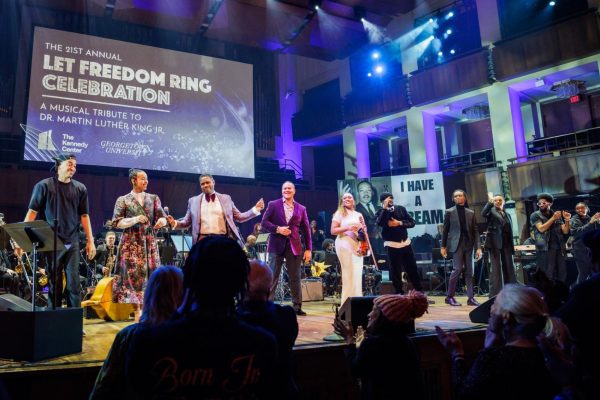Georgetown University partnered with the Kennedy Center for the Performing Arts to honor a Washington, D.C. advocate for incarcerated individuals at its annual Let Freedom Ring Celebration on Jan. 19.
Paula Thompson, the president of Voices for a Second Chance (VSC), a D.C. nonprofit organization which aids formerly incarcerated individuals in reentry, received the John Thompson Jr. Legacy of a Dream Award. The award, named after the coach emeritus of Georgetown men’s basketball and racial justice advocate, is presented annually to local leaders in social justice.

Thompson said principles of empathy, non-judgment and holistic care for clients’ well-being guide VSC’s work.
“We work hard to ensure that every individual feels seen and valued, not treated as just a case number,” Thompson wrote to The Hoya. “In practice, this means meeting people where they are, both physically and emotionally, and recognizing that each client has unique challenges and needs.”
The musical celebration began in 2003 as a part of the university’s Martin Luther King Jr. initiative, which hosts various annual events to honor King’s legacy. Grammy award-winning songwriter and Broadway star Christopher Jackson headlined this year’s celebration and stage and screen-actor Taye Diggs hosted the event.
Kenneth Giam (SFS ’28), who attended the event, said he was moved by the premiere of a new composition by music director Nolan Williams Jr. titled “Selma@60,” which opened the concert and remembered the 1965 civil rights marches from Selma, Ala., to Montgomery, Ala.
“They incorporated musical, narrative, dance and rap elements into the performance to tell the full story of the march, and it was incredible,” Giam wrote to The Hoya.
Nhan Phan (SFS ’28), another student who attended the event, said he was inspired by the emphasis on the humanity of the formerly incarcerated.
“In her work, she is keeping the dreams of the formerly incarcerated alive and helping them find their footing in the world,” Phan wrote to The Hoya. “We tend to have a biased view of the incarcerated as simply violent or harmful people, but Thompson strives to point out the humanity in the people she works with.”
Full Disclosure: Nhan Phan (SFS ’28) served as an Opinion columnist in Fall 2024.
Phan added that he found it particularly meaningful to attend the celebration on the eve of President Donald Trump’s inauguration.
“There is such a dystopian attitude, especially of this new administration, towards efforts to celebrate diversity, equity and inclusion,” Phan said. “Events like these are important because they actively celebrate the strides people are making to realize King’s vision.”
Giam said Thompson’s work is inspiring because it cares for individuals who are often disregarded.
“Something Paula kept repeating in a short recap video played before the awarding ceremony was ‘the power of a second chance,’” Giam wrote. “Her work definitely sees the good in everyone, even those who wronged others in the past.”
Thompson said developing reentry programs in Washington, D.C., requires innovative and specific solutions because the District is subject to local and federal jurisdiction and lacks a prison system comparable to state systems.
“This means that individuals from D.C. who are incarcerated are often detained in federal prisons scattered across the country,” Thompson said. “The distance from their families and communities creates additional barriers to successful reentry, such as a lack of consistent support networks and difficulty accessing local resources.”
Giam said that by presenting the Legacy of a Dream Award to Thompson, Georgetown recognizes activism that helps D.C.’s formerly incarcerated people as meaningful.
“For Georgetown to recognize her efforts is to garner greater awareness for this issue, and inject institutional credibility into her work, which is extremely impactful,” Giam wrote.
Thompson said VSC’s work is inspired by King’s beliefs in compassion, opportunity and justice.
“Our work is rooted in the idea that forgiveness is transformative — not only for the individuals we serve but also for their families and communities,” Thompson said. “By focusing on how our impact improves lives, we aim to carry forward Dr. King’s legacy of justice and equity, helping to create a ripple effect that uplifts entire communities.”



















